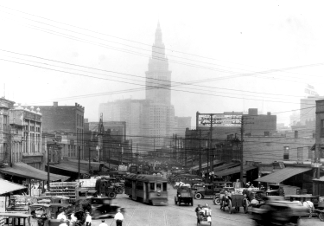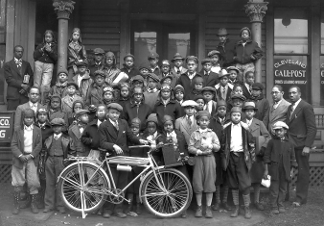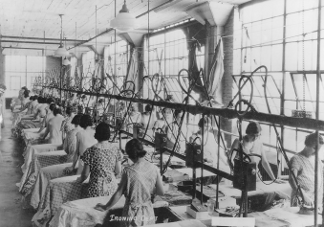MATHER, SAMUEL (13 July 1851-18 Oct. 1931), industrialist and philanthropist, son of Samuel and Georgiana Woolson Mather, was born and educated in Cleveland. He planned attending Harvard, then working at his father's business, Cleveland Iron Co., but had an mining accident requiring lengthy recuperation. In 1882, Mather affiliated with JAMES S. PICKANDS † and Jay C. Morse to form PICKANDS MATHER & CO., a rival to Cleveland Iron. After 2 years, the company leased a mine in the Gogebic Range, later acquiring interests in the Minnesota Mesabi and Michigan Marquette Ranges. Mather allied Pickands-Mather with the steel industry, providing resources and transportation; and facilitating the U.S. Steel merger in 1902. Success compounded his inherited wealth.
Mather was senior warden and vestryman of TRINITY CATHEDRAL, president of FEDERATED CHURCHES OF GREATER CLEVELAND, and a trustee and benefactor of HIRAM HOUSE. During WORLD WAR I he organized the War Chest, donating over $750,000, and receiving the Cross of the Legion of Honor from the French government. In 1919, he helped establish the COMMUNITY CHEST, contributing $100,000 annually, and in 1930 establishing a $1.6 million trust fund to insure its prosperity. Mather married FLORA STONE† in 1881 and fathered 4 children: S. Livingston (see SAMUEL LIVINGSTON MATHER†), Phillip, Constance, and Amasa Stone. When Mather died, he was the richest man in Ohio. His estate was divided among his children, grandchildren, and daughter-in-law, and various charitable causes. Major benefactors included WESTERN RESERVE UNIV., UNIVERSITY HOSPITALS CASE MEDICAL CENTER, JOHN CARROLL UNIVERSITY, Kenyon College, the Episcopal Church, St. Luke's Hospital of Tokyo, Japan, and the Community Chest. Because of declining stock values in the Depression, the bequests could not be paid. As the value of the estate increased with market improvements, heirs contested the will, since Mather had changed the terms within a year of his death, and some bequests (notably one to WRU) were invalidated.
Last Modified: 27 Oct 2003 01:26:46 PMMather Family Papers, WRHS.
- Related Article(s)









